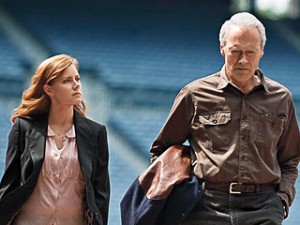Trouble With the Curve
Posted on September 20, 2012 at 6:00 pm
B| Lowest Recommended Age: | High School |
| MPAA Rating: | Rated PG-13 for language, sexual references, some thematic material, and smoking |
| Profanity: | Very strong language |
| Alcohol/ Drugs: | Drinking and scenes in bars |
| Violence/ Scariness: | Tense family confrontations |
| Diversity Issues: | None |
| Date Released to Theaters: | September 21, 2012 |
| Amazon.com ASIN: | B009AMAK0E |
 “Trouble with the Curve” pitches softballs to power hitters. It has major league players and a bush league script.
“Trouble with the Curve” pitches softballs to power hitters. It has major league players and a bush league script.
Clint Eastwood plays — surprise! — a grumpy old guy, a role he is too comfortable in, on and off screen. Here he is Gus Lobel, the John Henry of the Moneyball era. He is a baseball scout who relies on his instincts and experience while the youngsters look at metrics and formulas. His approach may be out of fashion, but the old-timers believe in him. The problem is that he is losing his eyesight. As he prepares to go on one last scouting trip, to watch a talented but arrogant power hitter, his friend (John Goodman) asks Gus’s estranged lawyer daughter (Amy Adams) to accompany her father on the road. Her name is Mickey, as in Mickey Mantle and the senior lawyers at her firm are about to decide between her and an ambitious fellow associate for a big promotion. She decides to go, bringing her laptop and a bunch of resentments and abandonment issues as well. And on the road they meet up with Johnny (Justin Timberlake), a former player turned scout, hoping to become the team’s radio commentator.
This is a “guy cry” movie. Guys can feel manly going to see it because it stars Clint Eastwood and it is about baseball and the individual literally against the machine, raging at the dying of the light and all that good stuff, so they don’t mind tearing up a little, or sitting through the romantic portion. While Matthew Lillard as Gus’s young rival explains that “these programs are an essential tool in evaluating today’s talent,” Gus knows that even if he can’t see talent, he can hear it. He’s been watching so long that he can tell from the crack of the bat whether a batter is hitting a fastball or a curve. And just as we know that the preening young prospect will need to be taken down a notch, we know that the guy in the suit who tells Mickey he wants to move their relationship forward because “we’re perfect on paper” will be gone by the second act. As will Mickey’s vegan cuisine, no match for a minor-league hot dog. And Timberlake’s shirt.
There’s nothing new or surprising here, except perhaps when things get completely over-the-top at the end. Oh, and Eastwood singing on screen for the first time since “Paint Your Wagon,” when he visits his late wife’s grave to attempt “You Are My Sunshine” with a gravelly warble.” “As you know, to hit the magical 300, you fail seven out of ten times,” Timberlake explains. This film is entertaining, but not especially memorable. Maybe it bats around .240.
Parents should know that this film has some strong and crude language (including the r-word), sexual references, a reference to child molestation, drinking and drunkenness, and a lot of smoking.
Family discussion: Why was it hard for Gus and Mickey to tell each other how they felt? Compare this movie to “Moneyball” – which approach to finding new players is the right one?
If you like this, try: “Field of Dreams” and “Gran Torino”

2 Replies to “Trouble With the Curve”
Comments are closed.